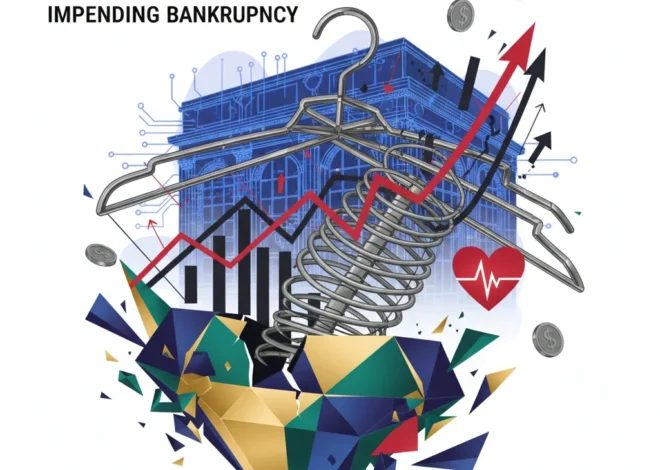
Media Megadeal: Why the Daily Mail’s £500M Bid for the Telegraph Could Reshape the UK’s Financial and Political Landscape
In a move sending shockwaves through the UK’s media, political, and financial sectors, the publisher of the Daily Mail has entered talks for a monumental £500 million acquisition of the Daily and Sunday Telegraph. This proposed merger isn’t just another corporate transaction; it’s a tectonic shift that could forge a right-leaning media powerhouse with unprecedented influence. For investors, business leaders, and anyone interested in the intersection of finance, politics, and media, this deal is a critical development with far-reaching implications for the national economy and public discourse.
The announcement, confirmed by the Daily Mail and General Trust (DMGT), positions the media giant as a leading contender in the high-stakes auction for the Telegraph Media Group (TMG). The sale was initiated after Lloyds Banking Group seized control of the titles from the Barclay family due to significant outstanding debts. This acquisition would unite two of the most prominent conservative-leaning newspaper groups in the United Kingdom, creating a behemoth in both print and digital news. Let’s delve into the mechanics of this deal, the strategic rationale behind it, and what it means for the future of the industry.
A Tale of Two Titans: Understanding the Players
To grasp the magnitude of this potential merger, it’s essential to understand the entities involved. This is not merely a transaction; it’s the potential fusion of two distinct legacies and media philosophies, each with a powerful voice in British society.
Daily Mail and General Trust (DMGT)
Helmed by Chairman Lord Rothermere, DMGT is a formidable force in global media. Its flagship publication, the Daily Mail, is a dominant player in the UK’s mid-market tabloid sector, known for its influential political campaigns and massive readership. Its digital arm, MailOnline, is one of the most visited news websites in the world, a testament to its successful, albeit aggressive, digital strategy. DMGT’s business model is a masterclass in monetizing mass-market attention, making its performance a subject of keen interest on the stock market. The group’s financial strategy has always been one of shrewd acquisitions and relentless pursuit of scale.
The Telegraph Media Group (TMG)
The Daily Telegraph, often referred to as the “Torygraph,” has long been the newspaper of choice for the British establishment. With a history stretching back to 1855, it holds a reputation for quality journalism and serves a loyal, affluent, and older readership. Its ownership by the Barclay family since 2004 has been tumultuous, culminating in financial distress that led to Lloyds Bank appointing receivers. Despite these ownership woes, the Telegraph brand remains powerful and its subscription-based digital model has shown promise, making it an attractive, if distressed, asset.
The potential sale has attracted a number of high-profile bidders, each bringing a different vision for the future of the storied newspaper. Below is a snapshot of the key players involved in this corporate drama.
| Entity | Key Interest / Rationale | Reported Bid Status |
|---|---|---|
| Daily Mail and General Trust (DMGT) | Seeks market consolidation, cost synergies, and amplified political influence. Aims to create a dominant conservative media group. | In talks for a reported £500m deal. |
| National World | A regional UK publisher looking to expand its national footprint and leverage its existing infrastructure. | Expressed strong interest in a potential merger. |
| Sir Paul Marshall | Hedge fund manager and co-founder of GB News, reportedly interested in acquiring the titles to bolster his media portfolio. | Reported to be a key contender in the auction. |
| Axel Springer | The German media giant, owner of Politico and Business Insider, could see the Telegraph as a prime entry into the UK news market. | Previously considered a potential bidder. |
The Strategic Calculus: More Than Just Newspapers
From a pure finance and business perspective, DMGT’s move is a calculated play for consolidation in a shrinking market. The economics of the traditional newspaper industry have been under assault for two decades, squeezed by declining print circulation and the siphoning of advertising revenue by tech giants like Google and Meta. In this environment, scale is survival.
A merger would unlock significant synergies:
- Cost Efficiencies: Combining back-office operations, printing presses, distribution networks, and administrative functions could strip out millions in redundant costs.
- Advertising Power: A unified sales team could offer advertisers unparalleled access to a massive and diverse conservative-leaning audience, from the Daily Mail’s mass-market readers to the Telegraph’s affluent subscribers, giving them more leverage in negotiations.
- Digital Subscription Acceleration: DMGT could leverage its digital expertise from MailOnline to bolster the Telegraph’s already respectable subscription base. The integration of financial technology (fintech) for seamless payments and sophisticated customer relationship management would be central to this strategy.
Beyond the balance sheet, however, lies the undeniable prize: influence. A combined DMGT-Telegraph entity would command a staggering share of the UK’s right-of-center discourse, wielding enormous power to shape public opinion and the political agenda. This concentration of influence is precisely what will attract the most intense regulatory scrutiny.
The Poisoned Chalice: Why the BBC's Top Job is a Case Study in Corporate Governance Failure
The Broader Economic and Investment Landscape
For those engaged in investing, this acquisition saga is a fascinating case study in a legacy industry grappling with disruption. The outcome will have tangible effects on the market and the wider media economy.
Impact on the Stock Market
An acquisition of this size would likely be viewed by the stock market as a bold, transformative move for DMGT. Initially, the company’s stock might see volatility due to the financial outlay and regulatory risk. However, if the deal succeeds and DMGT can demonstrate a clear path to achieving its projected synergies, investors may reward the company for its aggressive consolidation strategy. The key metrics to watch will be growth in digital subscriptions and the successful integration of TMG’s operations without disrupting its core readership.
The Role of Banking and Finance
This story is also a stark reminder of the power of the banking sector. It was Lloyds Banking Group’s decision to call in its loans that precipitated this entire sale process. The bank’s primary goal is to recoup its funds, making the highest credible bid the most attractive one. The entire auction is being managed by investment bank Goldman Sachs, a process that highlights the intricate machinery of corporate finance that underpins such mega-deals. According to a report from The Guardian, the financing for DMGT’s bid itself is complex, involving potential backing from Abu Dhabi-linked funds, adding a layer of geopolitical intrigue to the financial maneuvering.
The Shadow Portfolio: Is the Insurance Industry's Bet on Private Credit a Ticking Time Bomb?
Hurdles on the Horizon: Why This Isn’t a Done Deal
Despite DMGT’s strong position, securing the Telegraph is far from guaranteed. Several major obstacles stand in the way.
First and foremost is the aforementioned regulatory challenge. The UK government has the power to intervene in media mergers on public interest grounds. A 2021 report by the media reform group Enders Analysis highlighted that a combined Mail-Telegraph entity could control over a third of the national newspaper market, a figure that will surely raise red flags for regulators (source). The potential political backlash from opponents of media concentration cannot be underestimated.
Second, the competitive auction process means other bidders could still emerge with a more attractive offer or a proposal deemed more palatable by regulators. The involvement of figures like Sir Paul Marshall introduces a “passion project” element, where bidders may be willing to pay a premium for the prestige and influence that comes with owning the Telegraph and its sister publication, The Spectator magazine.
Finally, there is the challenge of cultural integration. The Daily Mail and the Daily Telegraph, while both conservative, have vastly different journalistic cultures, tones, and target audiences. Merging these newsrooms successfully would be a monumental management task, with a high risk of alienating staff and loyal readers alike if handled poorly.
The AI Chart-Topper: A Sound Investment or a Soulless Echo in the Market?
Conclusion: A Defining Moment for British Media
The proposed £500 million acquisition of the Telegraph by the Daily Mail’s publisher is more than a landmark business deal; it is a potential inflection point for the UK. It encapsulates the brutal economics of the modern media industry, the intricate dance of corporate finance, and the undeniable link between media ownership and political power.
For investors and financial professionals, this is a live-fire test of consolidation theory in a legacy industry. For business leaders, it’s a lesson in the high-stakes world of mergers and acquisitions, where regulatory hurdles and cultural fit are as important as the price tag. And for the general public, it’s a development that could fundamentally alter the media they consume and the political conversations that shape their country. The coming months will be critical, as the battle for the Telegraph will determine not just the fate of a newspaper, but the future contours of the UK’s media landscape.


